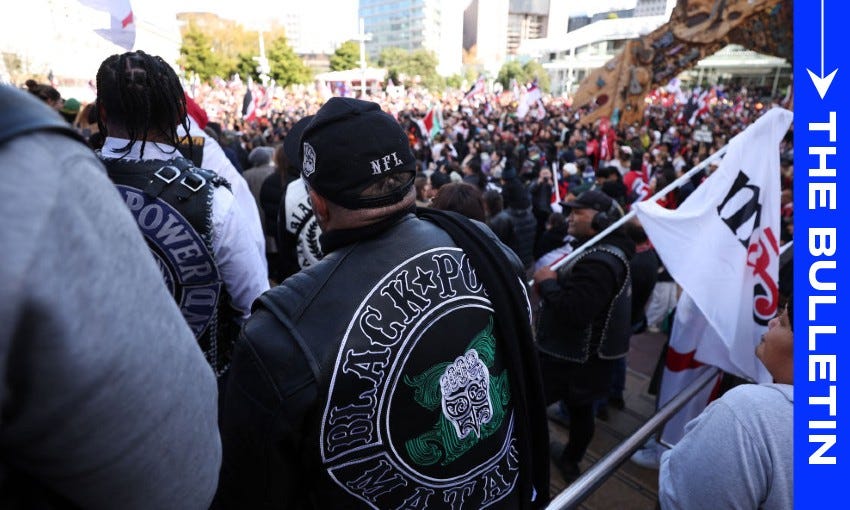Will banning gang patches actually make New Zealand safer?
Gang members say it will create more problems, but the government argues it's about improving public safety.
Mōrena, and welcome to The Bulletin for Thursday, November 21.
In today’s edition: Legislation to fix what was once labelled “our most racist immigration law” has passed, the “boot camp” bill will be debated in parliament before a pilot programme has concluded, and 230 workers are set to lose their jobs at Tokoroa’s Kinleith Mill. But first, new anti-gang legislation has come into effect.
New anti-gang rules now in force
On Tuesday, patched gang members were pictured walking alongside members of the community as part of the nationwide hīkoi to parliament. There was a large police presence at the event and nothing happened. But now, new anti-gang rules are now in place as part of the government’s “tough on crime” crackdown – and that would mean those gang members at the event would have been breaking the law. As The Spinoff’s Alice Neville explains comprehensively this morning, the new legislation will see police given powers to “to disrupt and directly target gang activity”. That includes the outlawing of gang insignia in public, but also means police can also issue dispersal notices and courts can issue non-consorting orders. Gang membership also becomes an aggravating factor in sentencing.
As Newsroom explained at the time, the government also widened the law at the last minute to allow police to arrest people for insignia kept in their home in certain circumstances.
Ahead of the law being passed, police issued a direct warning to gang members to leave their patches at home, saying officers were as ready as they possibly could be to enforce the rules. Though, as Stuff’s Marty Sharpe reported, some front line officers have expressed concern that the new legislation could stretch resources. “We just don’t have the staff to implement it. That’s the biggest thing. The gang members will still wear their patches. The concern is that there’ll be a shitfight and we just don’t have the staff to deal with it,” one officer, speaking anonymously, said.
The ‘free ride’ is over, says government
The government has framed these new rules as an attempt to end public fear, declaring that the “free ride” for gangs was now over. Police minister Mark Mitchell argued in an opinion piece for the Herald that gang patches were designed to “intimidate” and that outlawing them will make New Zealanders feel safer. But the opposition has claimed that ditching patches won’t stop gang members committing criminal acts, nor convince anyone to leave a gang, and could instead risk pushing marginalised communities further to the fringe. In comments to Bridie Witton for ThreeNews last night, Te Pāti Māori co-leader Rawiri Waititi believed it was an “attack on the disenfranchised and marginalised”, while Labour leader Chris Hipkins said it was simply about optics. "This is a measure by the government to look tough on crime,” he said.
The government’s move to outlaw gang patches and clamp down on gang consorting follows similar action taken in Australia, where some believe gang activity has been driven underground as a result. Others, however, say the outcome has been a stronger perception of public safety. As reported by Newsroom’s Laura Walters, new police research released on the eve of the ban coming into effect here provided evidence against a suppression approach to policing gangs.
‘It’s about identity’
Those actually in gangs have had a mixed response, understandably. In an interview with RNZ, a senior member of Black Power said that what gangs wore wasn’t the problem. "It's people's behaviours, be it gang members or not, at the end of the day when it comes to the law, you do the bloody crime, you do the time.” Back in October, E-Tangata’s Tiraroa Reweti interviewed several gang members who she had spent time studying with. One, who was kept anonymous, compared gang patches to a military badge. “It’s about identity,” they said. “Getting a patch identifies someone who’s gone through the hardships of prospecting and they’re now part of the pack.” Mongrel Mob member Ching Poipoi also expressed concern to RNZ that gang members may get into altercations with police in order to keep their patches and risked damaging any positive interactions with officers. “I can see some of them doing horrible things for it, you know what I mean, not just us, there's a lot of other gangs you know. Some of them will probably die for it," Poipoi said.
But back in July, for the debut episode of ThreeNews, host Samantha Hayes spent time with members of Black Power Movement Whakatāne. Genesis Te Kuru-White, the chapter’s leader, said his father had helped create a 100-year road map for the group that included a plan to to make the patch a thing of the past. “He said to me, my brothers, my cousins, all of us, that one day the patch would become something of the past.”
Gang expert Jarrod Gilbert warned in an interview with The Post that some gang members will simply opt to substitute patches for something else: “That may mean more tattoos, for example. I personally don’t think a person is going to be any less intimidated by a guy with ‘Mongrel Mob’ written across his face than they would a person with a patch on.”
New police commissioner named
Meanwhile, the country’s new police commissioner was announced yesterday. Richard Chambers takes over from Andrew Coster, who has gone on to lead the government’s new social development agency. According to RNZ, Chambers has long aspired to take on the position of top cop and is popular with frontline officers. At a press conference yesterday, as reported by the Herald’s Adam Pearse, Chambers said an “absolute focus” on core policing was a top priority for him over his five-year term, which formally begins on Monday. He said it was important to focus on “doing the basics well”, and wanted to support the wellbeing of those working on the frontline. In a clear change of direction from his predecessor, Chambers said he didn’t talk about “policing by consent”, but instead wanted to bolster “trust and confidence”.
Coster, who came under fire from National while in opposition for a purportedly “woke” approach to policing, argued in favour of getting public support for the role of police. He told E-Tangata in 2023: “We rely on the support of most of the community to be successful and that depends on the way we operate and on the extent to which people feel that they can trust us and that what we’re doing is appropriate.”
Support longform journalism in New Zealand at The Spinoff
Joel MacManus's longform investigation into the urgent race to solve homelessness in Aotearoa is the kind of vital journalism we can only do with support from Spinoff members and donors. If it matters to you, and you're able to, please donate or become a member today.
New law to restore pathway to citizenship for Samoan elders passes
Legislation to fix what was once labelled “our most racist immigration law” passed with unanimous support last night. As RNZ’s Grace Tinetali-Fiavaai reported, the Citizenship Western Samoa Restoration Amendment Bill, championed by Green MP Teanau Tuiono, restores a pathway to citizenship for a group of Samoans stripped of it because of a 1982 Muldoon era law.
Writing on The Spinoff, Tuiono acknowledged that it was uncommon for an opposition member’s private bill to gain support across the parliament.
For those people affected by the 1982 law, the bill passed today means they will be eligible for citizenship as of right, instead of having to go through the standard residency and citizenship application processes. If their application is successful they will also be refunded for the costs involved in the process. It is estimated that a maximum of 3,480 people would be able to benefit from the bill.
The passing of the bill represented a “step toward healing” intergenerational trauma caused by the original law, said Tuiono.
Boot camp bill to be debated – but pilot programme still under way
New legislation that will give judges the option of sending young offenders to military-style “boot camps” will have its first reading in parliament today. As Laura Walters reports for Newsroom Pro (paywalled), the new law is expected to be in place by the middle of next year. But it’s been introduced to parliament, and will be debated, before the government has had a chance to evaluate outcomes from its boot camp pilot programme. Children’s minister Karen Chhour says she has visited the youth justice facility where the pilot was being carried out on several occasions and received updates on it.
But critics, including children’s commissioner Claire Achmad and the Greens’ Tamatha Paul, have questioned whether the government was open to incorporating feedback from those in the current programme. “We simply shouldn’t be including anything that is military-based in youth justice when the evidence shows that what does work is trauma-informed, rehabilitative, wraparound approaches,” said Achmad.
The proposed legislation is also being introduced shortly after the formal apology to survivors of abuse in care. As The Spinoff’s Joel MacManus wrote back in July, a 110-page section of the abuse inquiry was dedicated to a case study of Te Whakapakari, a boot camp on Aotea, Great Barrier Island, where young offenders were subjected to extreme psychological, physical and sexual abuse.
Have you subscribed to The Weekend?
For your weekly wrap of the best and most read Spinoff content, along with some hidden gems, subscribe to The Weekend with Madeleine Chapman. You’ll get a special column written by the editor along with a handpicked selection of Spinoff stories perfect for weekend reading, delivered every Saturday morning.
Click and Collect
230 workers are set to lose their jobs at Tokoroa’s Kinleith Mill, accounting for 2.2% of the entire South Waikato workforce.
All charges against Brian Tamaki over Covid-19 lockdown protests have been dismissed.
An overhaul of name suppression laws will see convicted sex offenders only able to get suppression if the survivors of their offending agree.
The hīkoi may be over, but the aftermath carried on in parliament yesterday as accusations flew from both sides.
Worrying news on the climate front: New Zealand has dropped seven places to 41st in the global Climate Change Performance Index.
Children's watchdogs cannot properly monitor the use of force and seclusion on children in Oranga Tamariki facilities because not enough data is being collected, they say.
Would you want a house with a hydro slide? One just sold in the Bay of Plenty for what I reckon was a pretty modest $1.72m.
Health sector expert Dr David Galler argues that it’s not too late to halt the death spiral of New Zealand’s public health system. For The Spinoff Books Confessional, Jacqueline Bublitz, the author of new crime novel Leave the Girls Behind. Jean Teng shares a beginner’s guide to yum cha. And Kathy Holloway from Victoria University’s nursing school argues that New Zealand’s reliance on overseas-trained staff is not sustainable.
Some good news
To finish this morning, I thought I’d share a cool (literally) video. Auckland Zoo’s last elephant, Burma, recently travelled to her new home in Adelaide. The safari park where she now lives has been sharing videos of her settling in, and it appears all is going well. Here she is enjoying an elephant-sized ice block. I’d love one too, if it was a grapefruit Fruju.
That’s it for today. Thanks for reading and see you back here tomorrow morning.
Want to get in touch? Join the conversation in the Substack comments section below or via email at thebulletin@thespinoff.co.nz if you have any feedback on today’s top stories (or anything else in the news).
If you liked what you read today, share The Bulletin with friends, family and colleagues.



















Re: gang members and patches, this was my comment on it elsewhere:
- Puts a $120m fiscal cliff over police after police say most of their budget is headcount and they don't have enough resources,
- Fudges 500 police count numbers,
- Offers police a lower pay offer than the one rejected from Labour did and makes them lose a pay arbitration with experienced cops rushing to Australia in an exodus
- gaslights police into doing more work, despite under-resourcing them
- publicly sides with a gun lobbyist over police just because police wanted to have a say on gun reforms
- Uses different easier crime targets to measure own performance (versus what they used to slam Labour with in opposition)
- Loosens criteria for police recruitment
- Tell police to pull back from mental health callouts with no back up resources
- Exacerbates cost of living crisis, cuts food banks, cuts budgeting services, reduces beneficiary income, and punches down on Maori and other groups such as the disabled and poor
-Cuts customs front line staff.
What could go wrong?
Note Brian Tamaki is allowed to wear his gang colours and Seymour previously promised if he was in government they would "man up" together.